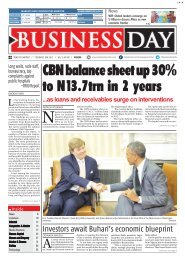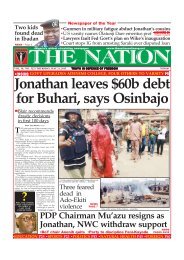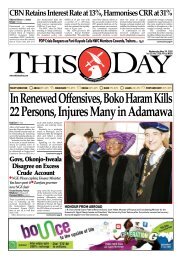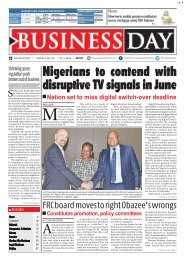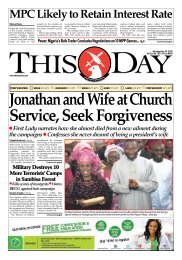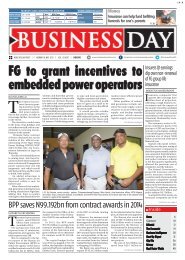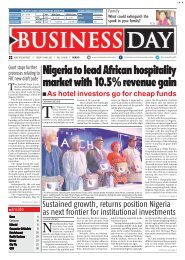business0521
You also want an ePaper? Increase the reach of your titles
YUMPU automatically turns print PDFs into web optimized ePapers that Google loves.
BUSINESS DAY<br />
NEWS<br />
YOU CAN TRUST I THURSDAY 21 MAY 2015<br />
LIBERAL VIEW<br />
As Buhari prepares to hit the ground running<br />
STEVE AYORINDE<br />
Ayorinde, a journalist, author<br />
and media consultant is the<br />
Vice-President (West) of the<br />
Nigerian Guild of Editors.<br />
stevo@businessdayonline.<br />
com<br />
A<br />
two-day conference<br />
aimed<br />
at unveiling its<br />
policy roadmaps,<br />
which ends today<br />
in Abuja by the All Progressives<br />
Congress, is a good way<br />
to further kit Muhammadu<br />
Buhari as he takes over government<br />
next Friday.<br />
An initiative of Policy,<br />
Research and Strategy Directorate<br />
of the APC Presidential<br />
Campaign Council,<br />
the conference hinges its<br />
objective on the theme “Implementing<br />
Change: From<br />
Vision to Reality”. The sense<br />
in this type of talk-shop is<br />
obvious – the president and<br />
his core team should be well<br />
kitted with ideas and realistic<br />
execution of vision in order<br />
to hit the ground running.<br />
With expectation among<br />
Nigerians very high, the<br />
change mantra through<br />
which Buhari earned victory<br />
at the polls must translate<br />
into quick deliverables<br />
without excuses. Using the<br />
type of conference that is<br />
holding in Abuja now is a<br />
way of wading through the<br />
gale of election promises<br />
and settling down to some<br />
early wins that must reassure<br />
the citizens that this General<br />
really means business.<br />
It is remarkable that a<br />
Buhari, who understands<br />
governance being a tested<br />
hand – as a former head of<br />
state, military governor and<br />
petroleum minister – could<br />
subject himself to this type<br />
of intellectual fortification.<br />
It speaks volumes about<br />
his readiness to lead a team<br />
that debates and why it is<br />
imperative to make his advisory<br />
template robust by<br />
expanding the quantum of<br />
discussions that will shape<br />
his government.<br />
It is unlikely that anybody<br />
in his shoes, particularly<br />
elected governors, will easily<br />
wade through the haze<br />
of governance in these economically-challenging<br />
times<br />
if he does not encourage and<br />
subject himself to a rigorous<br />
intellectual immersion and<br />
the culture of debates that<br />
should interrogate the vision<br />
and policies to be executed<br />
in government.<br />
Buhari’s example of generating<br />
good content that<br />
will drive his administration<br />
is therefore commendable.<br />
And it shows not just in the<br />
robust manifesto of his party<br />
or the elaborate discourse of<br />
the Abuja conference, but<br />
also in welcoming the Strategic<br />
Report by the Obasanjo<br />
think tank last week.<br />
Many people have hastily<br />
picked faults with former<br />
President Olusegun Obasanjo’s<br />
decision to constitute<br />
a committee that will assess<br />
the economy and produce<br />
a document that aims to<br />
guide the president-elect.<br />
Not a few have read political<br />
and ethnic meaning into<br />
Obasanjo’s gesture. Those<br />
who hate the former president’s<br />
guts say his intention<br />
is at best suspect, knowing<br />
his penchant for control<br />
and vainglory, and at worst<br />
perfunctory since he is the<br />
longest-serving president<br />
Nigeria ever had, having<br />
spent three-and-a-half years<br />
as head of state in the 1970s<br />
and as an elected president<br />
between 1999 and 2007. If he<br />
had fixed the rot, the naysayers<br />
say, the need would not<br />
have arisen for him to present<br />
a manual of operation<br />
to any of his successors.<br />
Given Obasanjo’s largerthan-life,<br />
often overbearing<br />
influence on those he<br />
chooses to assist, one might<br />
be tempted to query his<br />
intention. One might even<br />
question his moral qualification<br />
considering that just<br />
one week before his intervention<br />
to the presidentelect,<br />
he was forced to fire a<br />
trustee and London-based<br />
chief executive officer of his<br />
foundation after the United<br />
Kingdom Charity Commission<br />
raised concerns over<br />
allegation of money laundering.<br />
It turned out that<br />
the lady, Anne Welsh, was<br />
culpable. But rather than<br />
look the other way, as others<br />
in his place may have done,<br />
Obasanjo gave the CEO the<br />
boot.<br />
And so, it will be harsh<br />
to pick holes in his strategic<br />
intervention to Buhari just<br />
because it shouldn’t have<br />
come from him. Sure, helpful<br />
thoughts such as this<br />
could have come from anybody<br />
with an abiding interest<br />
in the Nigerian Project or<br />
anybody who wants Buhari<br />
to succeed. It will be<br />
the new president’s prerogative,<br />
however, to implement<br />
which advice best suits his<br />
purpose. But to reject strategic<br />
interventions based on its<br />
source will amount to a snub<br />
and will be in bad taste.<br />
In any case, it is not just<br />
Obasanjo’s idea. The thinktank<br />
was made up of eminent<br />
personalities like the<br />
former minister of finance,<br />
Idika Kalu, who served as the<br />
vice-chairman of the committee;<br />
Akin Mabogunje,<br />
chairman of the Governing<br />
Board, Centre for Human<br />
Security of the Olusegun<br />
Obasanjo Presidential<br />
Library; and Christopher<br />
Kolade, who headed the<br />
Power Committee in the<br />
think-tank and who once de-<br />
scribed President Goodluck<br />
Jonathan as lacking requisite<br />
leadership quality. These<br />
are well-meaning Nigerians<br />
whose opinions shouldn’t be<br />
discounted.<br />
What are they proposing<br />
to Buhari anyway? The<br />
things that most Nigerians<br />
already know: concentrate<br />
on economy, security, power,<br />
education and infrastructure.<br />
They could not have<br />
suggested a bogus plan on<br />
how Nigeria should send<br />
people to Mars or the need<br />
to develop nuclear power.<br />
The things that are holding<br />
the country down border on<br />
those five key areas identified:<br />
the need to truly free the<br />
economy from the shackles<br />
of corruption and transform<br />
it into a job creator, which of<br />
course can only be helped by<br />
a secure polity and 24-hour<br />
economy made possible by<br />
constant power supply.<br />
All these must have<br />
been captured in Buhari’s<br />
roadmap already. What are<br />
needed from the strategic<br />
document are specific recommendations<br />
on how the<br />
challenges in those areas can<br />
be effectively tackled. Buhari<br />
has already welcomed the<br />
initiative as one of the efforts<br />
to help him hit the ground<br />
running. The only thing left<br />
is to ask Obasanjo to assist by<br />
detailing the unsaid reasons<br />
why his own administration<br />
was unsuccessful in fixing<br />
the power sector after $16<br />
billion expended on it and<br />
the late Bola Ige had to be<br />
removed from that ministry<br />
abruptly. Granted that the<br />
Jonathan administration<br />
has eroded most of the gains<br />
from the Obasanjo years; yet,<br />
the former president ought<br />
to help with information on<br />
why the petroleum sector<br />
still defied solution under his<br />
reign even when he directly<br />
supervised that ministry in<br />
his first year in office and<br />
had to increase petroleum<br />
pump price a record 14 times<br />
without successfully fixing<br />
the four local refineries.<br />
He may then add an explanation<br />
on why Ngozi<br />
Okonjo-Iweala was redeployed<br />
from the Finance<br />
Ministry to Foreign Affairs<br />
before she resigned in protest.<br />
Knowing the things<br />
that got her removed under<br />
Obasanjo may well explain<br />
why the finances of this nation<br />
won’t just add up under<br />
a woman who purports to be<br />
the chief driver of the entire<br />
economy.<br />
The type of economy that<br />
Buhari should run must be<br />
at variance with Jonathan’s<br />
profligate type and several<br />
notches higher than Obasanjo’s.<br />
Having insider information<br />
on why the former<br />
president faltered in fixing<br />
power and the petroleum<br />
sectors and why he ignored<br />
the corruption in road infrastructure<br />
will be of value to<br />
the Buhari administration.<br />
Economy in transition (2)<br />
As the presidentelect<br />
has himself<br />
already noted, attracting<br />
FDI or a return<br />
of Diasporan funds will<br />
be critical to kick-starting<br />
our moribund economy. To<br />
do that we need to reduce<br />
the barriers to entry, make<br />
our economy more competitive<br />
and allay the fears of potential<br />
investors who clearly<br />
have a choice of where to put<br />
their money.<br />
As I have noted, the importance<br />
of an enabling<br />
infrastructure has been well<br />
documented. Muhammadu<br />
Buhari has already made<br />
tackling the problems of<br />
security and corruption two<br />
of his priorities. In last week’s<br />
column I noted investors’<br />
fears about their ability to<br />
manage their investment<br />
effectively, without undue<br />
interference – what we call<br />
the ‘ease of doing business’<br />
question. So, how does the<br />
new administration help<br />
Nigerian industry become<br />
more competitive by improving<br />
the business environment<br />
and thus our<br />
competitiveness?<br />
In several columns I<br />
have argued the case for<br />
implementation of Stephen<br />
Oronsaye’s report. Earlier<br />
this year I wrote: “It has<br />
been recognised that this<br />
duplication and regulatory<br />
inefficiencies are a cost and<br />
an administrative burden.<br />
The Oronsaye report itself<br />
recommended abolition of<br />
38 agencies, merger of 52<br />
and reversion of 14 agencies<br />
to departments. A breakdown<br />
of what could be saved<br />
was quoted as N124.8bn<br />
from agencies proposed for<br />
abolition; N100.6bn from<br />
agencies proposed for mergers;<br />
N6.6bn from professional<br />
bodies; N489.9bn from<br />
universities; N50.9bn from<br />
polytechnics; N32.3bn from<br />
colleges of education, and<br />
N616m from boards of federal<br />
medical centres. This is<br />
in addition to the increased<br />
efficiency and savings in<br />
the private sector. The CME<br />
herself told This Day recently<br />
that in reference to reducing<br />
the nation’s recurrent expenditure,<br />
‘you are right, we<br />
should look at the Oronsaye<br />
report’, but cited legislative<br />
hurdles for the failure to take<br />
action. She went on to say,<br />
‘We have to bite the bullet<br />
…. We have to look at those<br />
agencies that are duplicating<br />
efforts’. But over two years<br />
on from the report, nothing<br />
seems to have been done.”<br />
This is not a new problem.<br />
The Oronsaye report<br />
itself noted that “the Ahmed<br />
Joda Committee (1999) posited<br />
that the challenge of<br />
ministerial interference and<br />
bureaucratic control needed<br />
to be eliminated in order to<br />
restore the effectiveness and<br />
efficiency of parastatals in<br />
the delivery of service to the<br />
public. In addition, the Joda<br />
report alluded to the challenge<br />
of lack of managerial<br />
competence in some of the<br />
parastatals as well as the<br />
incompetence and unnecessary<br />
size of some boards that<br />
had over 10 members”.<br />
This then is a ‘win-winwin’.<br />
The government reduces<br />
recurrent expenditure<br />
AND increases the efficiency<br />
of our governance structure<br />
AND improves the business<br />
environment. I will not say<br />
‘at a stroke’ because it will<br />
have its difficulties. As the<br />
CME herself noted, some of<br />
these agencies are enshrined<br />
in law. The fact that so many<br />
administrative regulations<br />
are enshrined in statute is<br />
itself a problem and would<br />
benefit from a thorough<br />
overhaul but being realistic,<br />
this would be a major<br />
task and not achievable as a<br />
quick win. So, somehow, we<br />
need to be pragmatic and<br />
push through these changes<br />
by making an absolute case<br />
for the reform. This will also<br />
entail hurdling another barrier<br />
in that it would require<br />
a major programme of retrenchment<br />
and redundancies.<br />
No government will do<br />
this lightly, especially one<br />
that is prioritising employment<br />
as a policy. However,<br />
in the longer term, taking<br />
the tough decision will free<br />
up funds for investment,<br />
increase efficiency and productivity<br />
and will lead to<br />
the creation of more jobs.<br />
Employment not for pen<br />
pushers and timeservers but<br />
for people ready to provide<br />
value add and productivity<br />
to our economy. If this seems<br />
harsh, I will take a longer<br />
look at the issue.<br />
In a 2013 paper on the<br />
‘Civil Service and the Cost of<br />
Governance’ for the University<br />
of Nigeria, Okechukwu<br />
Eme and Ogbechie Andrew<br />
quoted some typical examples<br />
of inefficiency: “The cost<br />
of running the government<br />
is also questioned in the incessant<br />
and uncontrollable<br />
duplication of government<br />
agencies and its attendant<br />
cost of funding. An example<br />
of such duplication is the Nigerian<br />
Maritime and Safety<br />
Agency (NIMASA), whose<br />
functions are duplicated<br />
by the Presidential Implementation<br />
Committee on<br />
Maritime Safety and Security<br />
(PICOMSS). Also, many of<br />
the functions of the Nigeria<br />
Police Force are performed<br />
by other agencies. For instance,<br />
the Special Fraud<br />
Unit of the Police carries out<br />
functions that are not exactly<br />
dissimilar to what the Economic<br />
and Financial Crimes<br />
Commission and the Independent<br />
Corrupt Practices<br />
Commission carry out. The<br />
functions of its traffic divi-<br />
sion are duplicated by the<br />
Federal Road Safety Commission<br />
and Road Traffic<br />
Service, also known as VIO,<br />
while the National Security<br />
and Civil Defence Corps perform<br />
the security role of the<br />
Police. Yet another example<br />
is the Border Community<br />
Development Agency and<br />
National Boundary Commission.”<br />
(Continues next week)<br />
OUTSIDER<br />
KEITH RICHARDS<br />
Richards is a director of a number<br />
of Nigerian institutions and<br />
businesses and lives in Lagos.<br />
outsiderinsideng@gmail.com<br />
@Outsiderinside1<br />
INSIDE<br />
Published by BusinessDAY Media Ltd., The Brook, 6 Point Road, GRA, Apapa, Lagos. Business Day Ghana Ltd; ABC Junction, near Guinness Ghana Limited, Achimota – Accra, Ghana.<br />
Tel: +233243226596: email: mail@businessdayonline.com Advert Hotline: 08116759801, 08082496194. Subscriptions 01-2950687, 07045792677. Newsroom: 08022238495<br />
Editor: Phillip Isakpa. All correspondence to BusinessDAY Media Ltd., Box 1002, Festac Lagos. ISSN 1595 - 8590.



